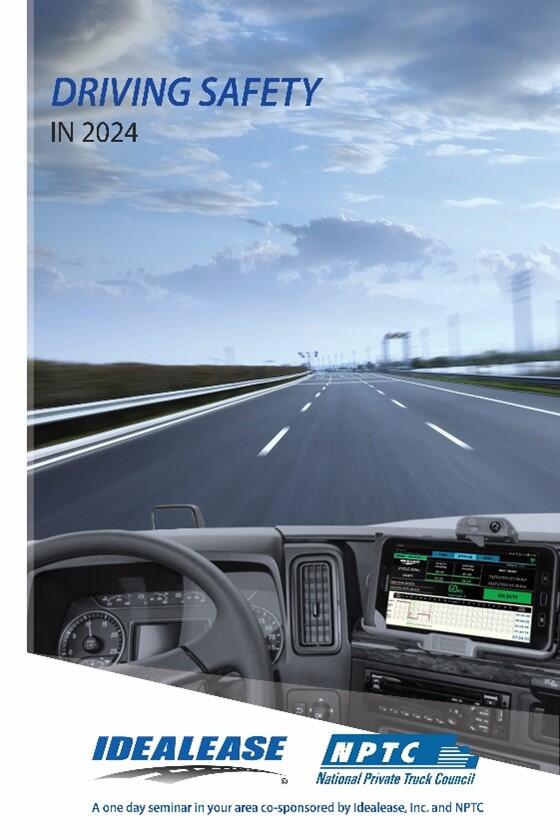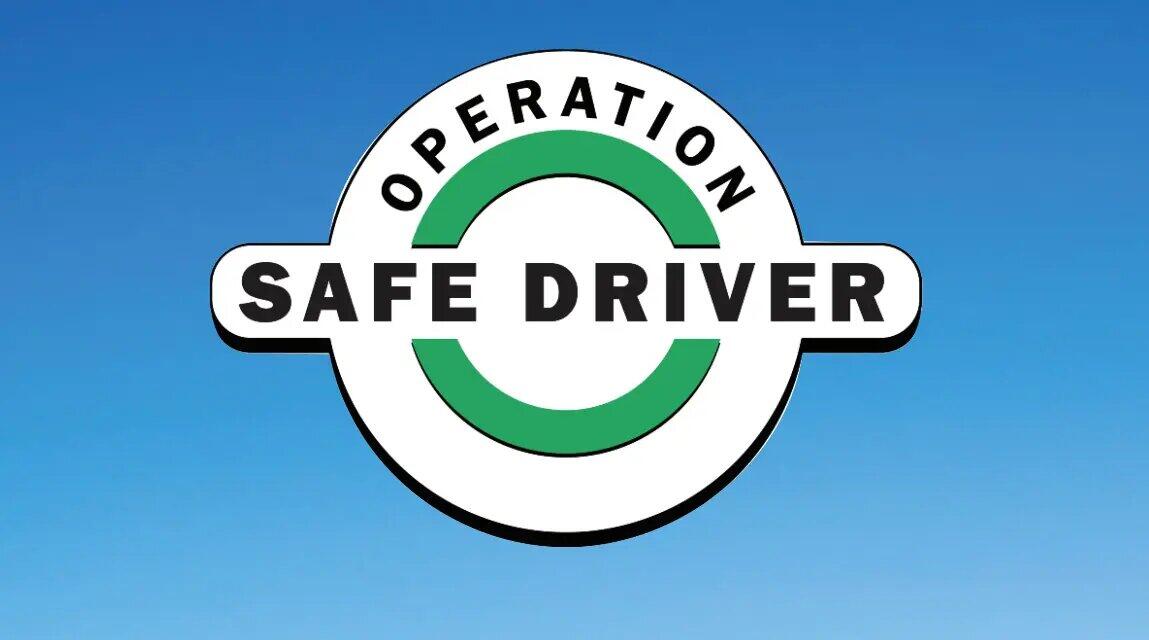New Regulations in the Works!
Check out the latest Idealease Safety Bulletin to read our proposed new regulations. Subscribe to receive all future bulletins.
In this issue:
- CVSA Schedules Operation Safe Driver Week for July 7-13
- CVSA’s International Roadcheck Is Scheduled for May 14-16
- Registration Now Open for the 2024 Idealease/NPTC Safety Seminars!
Check out the newest Idealease Bulletin! It delves into the pressing issue of the aging trucking workforce and offers valuable insights on how we can tackle this challenge head-on. Subscribe to receive the latest safety bulletins straight to your inbox.
As is customary during the final year of an administration, we anticipate introducing several new regulations before the upcoming fall election. Let's explore the proposed changes:
Meal and Rest Break Preemption
In 2018, the Federal Motor Carrier Safety Administration (FMCSA) overruled California’s rules on meal and rest breaks for drivers of large trucks and buses traveling between states. This means that these drivers do not have to follow the California rule that they take a 30-minute meal break after 5 hours of work and a 10-minute rest break after 4 hours of work. In 2020, FMCSA also overruled similar rules in Washington. The U.S. Court of Appeals for the 9th Circuit upheld the decision about California on January 15, 2021. The challenge to the decision about Washington was withdrawn. This means that drivers who have to follow FMCSA rules do not have to follow the meal and rest break rules in California or Washington. In addition, about 18 other states have similar rules that are also not being enforced for these drivers.
Speed Limiting Device Rulemaking
On May 4, 2023, the FMCSA issued an Advance Supplemental Notice of Proposed Rulemaking to move forward with a rule on speed limiting devices for motor carriers operating large vehicles in interstate commerce. The rule would apply to vehicles equipped with electronic engine control units capable of limiting the vehicle's speed to be determined by the rulemaking and maintaining that setting for the vehicle's service life. The notice does not specify the proposed maximum speed. The NPTC filed comments opposing a nationwide uniform speed limit due to variations in geography, road conditions, and traffic congestion, but expressed support for vigorous enforcement of posted speed limits. A new proposed rule is expected to be issued with a target date of May 2024 in the DOT semiannual agenda.
Safety Fitness Determination Rulemaking
In August 2023, the Federal Motor Carrier Safety Administration (FMCSA) requested feedback on how it can better use data and resources to identify and remove unsafe motor carriers from operating commercial motor vehicles (CMVs).
FMCSA specifically sought input on using safety data, such as inspection data, to assess carrier fitness to operate, potential changes to the current three-tier safety fitness rating structure, and the Federal Motor Carrier Safety Regulations used in the safety fitness rating methodology.
The National Private Truck Council (NPTC) submitted comments recommending that FMCSA retain the "conditional" rating and broaden the data used to evaluate carriers.
Subsequently, the agency plans to issue a Notice of Proposed Rulemaking in June 2025.
Automatic Emergency Braking Rulemaking
FMCSA and National Highway Traffic Safety Administration plan to make a new rule in April 2024. The rule will require and standardize how well automatic emergency braking systems work on heavy trucks. The rule will set standards for how well the systems should work and how often they should be checked. NHTSA and FMCSA have talked to people across the country, shared information, and collected data. They have also made training materials for truck companies, drivers, and maintenance workers about AEB technology.
Automated Driving Systems Rulemaking
FMCSA plans to propose a new rule to update certain Federal Motor Carrier Safety Regulations. The goal is to ensure the safe use of commercial motor vehicles equipped with automated driving systems (ADS) on public roads. The proposed changes will impact CMV operations, inspection, repair, and maintenance regulations. They will also distinguish between human operators and ADS. FMCSA started gathering feedback in 2017 and requested comments in 2018 to identify which regulations might hinder the safe testing and use of ADS-equipped CMVs. The aim is to create federal regulations that prevent inconsistent state regulations from obstructing ADS development.
Oral Fluid Samples for Drug Testing
On May 2, 2023, the Department of Transportation (DOT) issued a final rule that allows the use of saliva (oral fluid) samples for drug testing across all modes of transportation. The Department of Health and Human Services (DHHS) has confirmed that testing oral fluids is as reliable as testing urine. All collections of oral fluids will be observed to reduce the chance of substituted or adulterated samples. Employers will have the option to use oral fluid testing as an alternative to urine sample testing. The rule includes methods for dealing with "dry mouth," similar to a shy bladder. However, the rule cannot be implemented until DHHS certifies at least two labs for oral fluid testing (one for testing the initial sample and another for testing the split sample). There is no deadline for certification, but it is expected to happen soon.
Hair Samples for Drug Testing
FMCSA denied a request for an exemption to use hair samples in DOT drug tests. The exemption was denied because the Department of Health and Human Services has not finalized its guidelines for hair testing in federal drug testing programs, despite proposed guidelines being published in Sept 2020.
CDL Flexibility Proposal
The FMCSA has proposed new rules to make it easier for people to get a commercial driver’s license. The proposed changes include:
- Allowing CDL applicants to take the skills test in a different state than where they live
- Letting a CLP holder who has passed the skills test drive a CMV on public roads without a qualified CDL holder in the passenger seat
- Removing the 14-day waiting period to take the skills test after getting a CLP
- Requiring third-party knowledge examiners to meet the same standards as state examiners, and third-party knowledge testers to meet the same auditing and monitoring requirements as third-party skills testers.
18–20-Year-Old Driver Pilot Program
The Safe Driver Apprenticeship Pilot program allows 18 to 20-year-old drivers to operate CMVs in interstate commerce under certain conditions. The 3-year pilot will collect data to determine if the FMCSA could adjust the minimum driving age from 21. The pilot was required by Congress in the 2021 Infrastructure Investment and Jobs Act. However, to date, only a few carriers are taking part in the program. Congress believes that the low participation is due to additional requirements added by the FMCSA, including registration with the Department of Labor’s apprenticeship program and the use of inward-facing cameras in all vehicles used in the pilot program. In 2024, Congress removed these requirements in the DOT appropriations act.
NHTSA Trailer Underride Retrofit Requirement
March 14, 2024
The National Highway Traffic Safety Administration (NHTSA) Advisory Committee on Underride Protection (ACUP) will recommend to Congress that any trailer built since 1998 meet the Insurance Institute for Highway Safety (IIHS) ToughGuard standards.
(above proposed regulation information provided by the National Private Truck Council (NPTC)
CVSA’s International Roadcheck Is Scheduled for May 14-16
The International Roadcheck, organized by the Commercial Vehicle Safety Alliance (CVSA), will take place from May 14-16. This three-day event focuses on inspecting commercial motor vehicles and enforcing compliance with regulations across Canada, Mexico, and the United States.
Law enforcement personnel certified by CVSA will conduct inspections at weigh/inspection stations, temporary sites, and mobile patrols to ensure that commercial motor vehicles and drivers comply with federal, state, provincial, or territorial regulations. The data collected during this 72-hour period will be analyzed, and the results will be released this summer.
This year, the International Roadcheck will emphasize two areas: tractor protection systems and alcohol and controlled substance possession. The use of controlled substances and alcohol by commercial drivers remains a significant concern, with an increasing number of prohibited drivers listed in the U.S. Drug and Alcohol Clearinghouse (DACH), posing a threat to road safety.
The focus on tractor protection systems aims to raise awareness about critical vehicle components such as the tractor protection valve, trailer supply valve, and anti-bleed back valve among drivers, motor carriers, technicians, and enforcement personnel. These components are often overlooked during inspections but are crucial for safety. To facilitate proactive assessment and maintenance, CVSA has provided an inspection bulletin outlining the steps for proper checks, available in French and Spanish.
During the International Roadcheck, inspectors will conduct routine North American Standard Level I Inspections, a comprehensive 37-step procedure examining vehicle components and driver documentation.
For more information on Roadcheck 2024, visit: [https://www.cvsa.org/news/2024-international-roadcheck/]

Registration Now Open for the 2024 Idealease/NPTC Safety Seminars!
Driving Safety in 2024
Idealease and the National Private Truck Council (NPTC) are excited to announce the opening of registration for the 2024 Safety Seminars. These one-day seminars will focus on crucial topics such as safety data analysis, basic safety and compliance, regulation changes, and CSA.
Who Can Attend: These seminars are open to all Idealease customers, potential customers, and NPTC members, and are provided at no charge.
Seminar Highlights:
- Gain insights into safety practices and compliance regulations.
- Learn about the latest advancements in safety technology.
- Understand CSA (Compliance, Safety, Accountability) and its impact on your operations.
Why Attend: Whether you're a novice or experienced transportation professional, these seminars offer valuable information to enhance your safety practices.
Registration Details: Seminars are currently available for registration, with venues secured for the following locations:
Spring 2024
- 4/10/24: Sun Prairie, WI
- 4/18/24: Frankfort, KY
- 5/9/24: Tampa, FL
- 5/21/24: Portland, OR
- 5/23/24: Santa Rosa, CA
Fall 2024
- 10/1/24: Eugene, OR
- 10/3/24: San Leandro, CA
- 10/9/24: Baltimore, MD
10/28/24: Stockton, CA
Note: If you don't see a seminar in your area listed yet, don't worry. Registration availability will be updated weekly as venues are secured. Keep an eye on this bulletin for the latest updates.To register for an upcoming seminar in 2024, click on the following link: Safety Seminar Registration. Don't miss out on this opportunity to enhance your safety knowledge and practices in 2024. Register today!

CVSA Schedules Operation Safe Driver Week for July 7-13
The Commercial Vehicle Safety Alliance has scheduled its Operation Safe Driver Week for July 7-13, 2024. According to CVSA, the program is a safe-driving awareness and outreach initiative aimed at improving the driving behaviors of passenger vehicle drivers and commercial motor vehicle drivers through educational and traffic enforcement strategies and interactions with law enforcement. Roadcheck will have two focus areas this year – tractor protection systems and alcohol and controlled substance possession.
*The Idealease Safety Bulletin is provided for Idealease locations and their customers and is not to be construed as a complete or exhaustive source of compliance or safety information. The Idealease Safety Bulletin is advisory in nature and does not warrant, guarantee, or otherwise certify compliance with laws, regulations, requirements, or guidelines of any local, state, or Federal agency and/or governing body, or industry standards.
